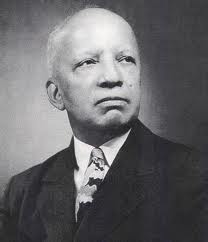
Carter G. Woodson was born on Dec. 19, 1875 in New Canton, Virginia. Woodson is often known as the “Father of Black History.” He was the son of freed slaves, and worked as a sharecropper to help his family. One of the first African-Americans to receive a doctorate from Harvard, Woodson dedicated his career to the field of African American history, and lobbied extensively to establish Black History Month as a nationwide institution.
In 1915, Woodson helped found the Association for the Study of Negro Life and History (which later became the Association for the Study of Afro-American Life and History). The next year he established the Journal of Negro History, a scholarly publication. Woodson also formed the African-American-owned Associated Publishers Press in 1921, which produced several of his own works, including The Negro in Our History (1922) and Mis-Education of the Negro (1933).
Woodson lobbied schools and organizations to participate in a special program to encourage the study of African American history, which began in Feb. 1926 with Negro History Week and was later expanded and renamed Black History Month. To help teachers with African American studies, he created the Negro History Bulletin in 1937. While Woodson died on Apr. 3, 1950, his work continues on. Every February, students around the United States spend time learning about the subject closest to his heart—African American history.




